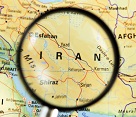At the end of World War II, a number of countries in the Middle East experienced a rise of ethnic separationist independence movements. The same was the case in Iran, where the Azerbaijani independence movements grew rapidly in post-World War II years.
In 1925, the Qajar Dynasty was overtaken by the Pahlavi Dynasty, with the support of the US and UK. These forces continued support for the Pahlavi Dynasty, as an ally against the Soviet Union. Azerbaijan was one of the first locations where pre-Cold War tensions between the Soviet Union and Western Imperial powers began. When Azerbaijani independence movements grew, the US and UK had interests in crushing these movements, out of fear that Azerbaijan would grow to be allies of the Soviet Union. As such, the Pahlavi Dynasty was able to repress Azerbaijani independence movements with the support of their Western allies.
In 1946, the Soviet Union was in support of Azerbaijani independence movements and did not withdraw from Northern Iran, in violation of a treaty, which caused suspicions among Western Imperial states. During this time, Azerbaijani communities were leaning towards Communist ideology, thinking it could be a possible way out of the repression of the Pahlavi Dynasty.
In May 1946, the Soviet Union withdrew from Northern Iran. In December of the same year, Iranian forces entered Northern Iran to massacre over 30,000 civilians in an attempt to reassert their control over Northern Iran and forcibly crushed Azerbaijani independence groups. During this time, they also targeted Azerbaijani cultural heritage and burned books written in Azeri language. After this 1946 Crisis, the Iranian assimilation project started, targeting Azerbaijani and other ethnic groups.
This makes it clear that whether under the control of the monarchy or the Islamic Republic, Azeri Turks face repression and ethnic discrimination regardless.
Why does Western or Soviet intervention have a role to play within Iranian local political struggles? Why do the interests of Western states overpower the rights of Azerbaijani people?
It is important for us as Azerbaijani Turks to commemorate the 1946 Crisis in order to acknowledge the long struggle for independence that our people have fought and continue to fight for. Since this time, Azerbaijani people have been under heavy repression both from the Iranian monarchy and the Islamic Republic, as well as from Western forces. Due to this, the stories and the history of Azerbaijani people remains unknown. It is our role to carry forward the memories and the bravery of our people


